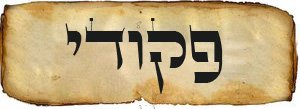|
What is more important: A team mentality, where every person belongs to a whole, giant community which is greater than is constituent parts? Or, is it more important to stress the worth of the individual, how each person was created by God, utterly unique, with his own talents and abilities which need to be nurtured in isolation?
This friction, between the whole and its parts, is encapsulated by the names Vayakhel and Pekudei, tow parshiyos that are often read together.
Vayakhel means "assembled," as in "Moses assembles." in Hebrew, there are many words which mean "gather," but "vayakhel" in particular emphasizes how all the assembled members merge identity to form a single whole, an "assembly."
Pekudei, means "counting," an idea which stresses the worth of the individual, how every person "counts" as a separate entity.
So when these tow parshiyos come together, the Torah is teaching us - and giving us the spiritual potential - to harmonize these tow opposing qualities.
in particular terms, this can take a number of expressions:
- Vayakhel represents quality in our Divine service, since merging with a greater whole confers on a person a qualitatively superior experience. He is now a "member" of a greater cause that he could not reach alone. pekudei, on the other hand, represents the advantage of quantity.
- Vayakhel represents a penetrating view of the world, where the details of existence pale away to reveal a holistic, spiritual mass - the realization that there is nothing but God (Elokus b'pshitus). Pekudei represents a smaller view of the world, where every detail is seen in its own right, with the understandings that every detail reveals God's in its own way.
- Vayakhel teaches us that however low a person may be, he is still part of the communal whole, and thereby intimately associated with the leaders of the community. Pekudei teaches us that, however low a person may be, he still has his own unique talents which God did nor give to any other person.
(Based on Sichas Shabbos Parshas Shemos 5740. 5743, 5752)
|
